A British national living in the UK has been accused by police in Hong Kong of jeopardising China's national security and told he faces three years in jail.
Benedict Rogers runs Hong Kong Watch, a charity which campaigns for human rights in the former British colony.
But he has been informed that he faces charges of "collusion with foreign forces" if he ever returns there.
Foreign Secretary Liz Truss said the threat was "unjustifiable". Mr Rogers said his group would not be silenced.
"We will continue to be a voice for the people of Hong Kong and those brave political prisoners who have been jailed under this authoritarian regime," he said.

Hong Kong: Briton accused of jeopardising China's security
Human rights activist is threatened with jail for "collusion with foreign forces" over Hong Kong campaign.www.bbc.co.uk
Install the app
How to install the app on iOS
Follow along with the video below to see how to install our site as a web app on your home screen.
Note: This feature may not be available in some browsers.
You are using an out of date browser. It may not display this or other websites correctly.
You should upgrade or use an alternative browser.
You should upgrade or use an alternative browser.
Taiwan's Ministry of Justice has tasked its Investigation Bureau to conduct a series of raids around the island and hauled in 60 Chinese nationals suspected of lifting trade secrets or poaching talent from China-owned firms.
The raids took place on Wednesday March 9, with over 100 investigators dispatched to 14 locations in four Taiwanese cities. Some of the companies searched include Advanced Manufacturing EDA Co., Bouson International, Vimicro, Beijing Yinxing Technology, VeriSilicon, Analogix Semiconductor, Key Technology, and GLC Semiconductor.
Additionally, the investigators swept eight illegal companies or research and development centres for offenses like creating fake foreign-funded companies. The Bureau said the efforts circumvent Taiwan's laws, with assistance of local entities or transfers to companies in other regions. Specifically, the firms allegedly disguised and concealed the identity of source funds, maliciously poaching and stealing secrets to gain an economic advantage for China.
"The Chinese Communist Party has made a large-scale detour to Taiwan through mainland enterprises and poached Taiwan high-tech industry talents with high salaries," explained the Investigation Bureau of the Ministry of Justice. "In addition to seriously affecting the economy and capital market, it has also endangered Taiwan's international competitiveness and national security."
Local news outlet UDN reported that Chinese headhunters were specifically looking to poach experts in integrated circuit design, electronic design automation, telecommunications, and electric vehicle manufacturing.
The Bureau pledged to continue its investigations.
Taiwan's resistance to China's persistent efforts to gain trade secrets and poach employees is ongoing. In 2013, the not-quite-nation saw eight technology theft cases reported. By 2021 that number was up to 26, with over NT$200 billion ($7.4B) worth of intellectual property on the line.
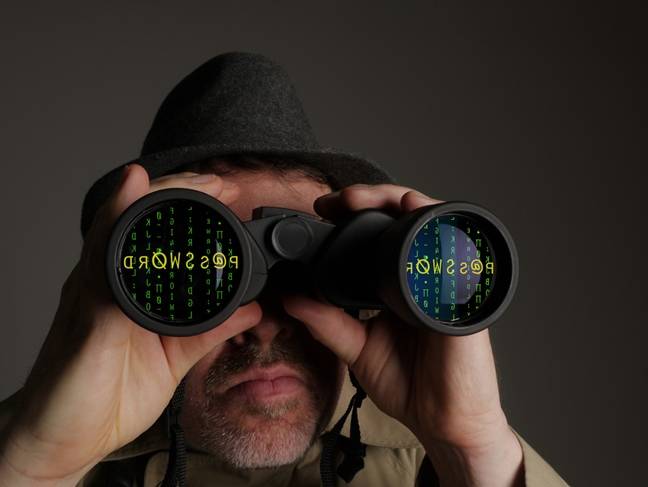
Taiwan rounds up 60 Chinese tech workers
The fight against economic espionage and skullduggery continues
Hundreds of Taiwanese military reservists carried out training exercises on Monday after the island's president called for "unity" as the Ukraine war rattles nerves over the threat of invasion from China.
Taiwan last year stepped up its training regime for reservists as tensions rise with Beijing, which sees the self-ruled island as part of its territory to be seized one day, by force if necessary.
About 400 personnel took part in target practice Monday in a programme designed to boost their combat readiness. Their training kicked off earlier this month and simulates defending a beach near the capital Taipei.
It comes as Taipei keeps a close watch on Russia's invasion of Ukraine, with President Tsai Ing-wen appearing in front of the reservists on Saturday stressing the need for unity in defending the island.
"The recent situation in Ukraine once again proves that the protection of the country, in addition to international solidarity and assistance, depends on the unity of the people," she said in a speech dressed in military fatigues and body armour.
Major General Chen Chung-chi, director of Taiwan's 6th Army Command, stressed the importance of reservists in addition to full-time troops.
"The security of the whole country does not just depend on the soldiers," he told AFP on Monday.
"In Ukraine, we see soldiers in the battlefield, and some men... who go to battle after sending their wives and children to safety."
"Military power is limited but the power of the people is unlimited."
Reservist Shi Hui-bin said the immersion training kept him prepared and up to date with current military tactics.
"When the time comes, I will know what to do," he told reporters after a round of shooting practice.
China's sabre-rattling against Taiwan has ramped up since Tsai took office in 2016 as she rejects Beijing's view that Taiwan is part of "one China".
Chinese warplanes have increasingly breached Taiwan's air defence zone and Moscow sides with Beijing that Taiwan is "an inalienable part" of China
A UK-based rights group has pledged not to remain silent after Hong Kong’s government demanded it shut its website and accused it of endangering China’s national security.
While China heavily restricts the internet on the mainland, Hong Kong does not generally censor the web, allowing residents to access sites and content that might be critical of Beijing.
However, Monday’s announcement means Hong Kong Watch is the first overseas advocacy group to confirm it is being targeted under a sweeping national security law that Beijing imposed to snuff out dissent in the territory in mid-2020.
“By threatening a UK-based NGO with financial penalties and jail for merely reporting on the human rights situation in Hong Kong, this letter exemplifies why Hong Kong’s national security law is so dangerous,” said the group’s chief executive, Benedict Rogers.
Rogers, who was barred in 2017 from visiting Hong Kong, added: “We will not be silenced by an authoritarian security apparatus which, through a mixture of senseless brutality and ineptitude, has triggered rapid mass migration out of the city and shut down civil society.”
Hong Kong’s security bureau accused the group of “colluding with foreign forces to endanger national security,” according to an email sent on 10 March that Hong Kong Watch posted in full on its website on Monday.
The offence, one of the four major crimes under the security law, carries a maximum penalty of life imprisonment.

Hong Kong demands UK-based rights group shut down website
‘We will not be silenced,’ says CEO after government accuses Hong Kong Watch of endangering China’s national security
If you’re among those of us with immediate plans for a PCB or parts order from China, watch out – Shenzhen just recently got put on a week-long lockdown. Factories, non-essential stores and public places are closed, and people are required to spend time at home – for a city that makes hardware thrive, this sounds like a harsh restriction. Work moves to remote where possible, but some PCB fabs and component warehouses might not be at our service for at least a week.
It might be puzzling to hear that the amount of cases resulting in closures is as low as 121, for a city of 12.6 million people. The zero-tolerance policy towards COVID has been highly effective for the city, with regular testing, adhered-to masking requirements and vaccinations – which is how we’ve been free to order any kinds of boards and components we needed throughout the past two years. In fact, 121 cases in one day is an unprecedented number for Shenzhen, and given their track record and swift reaction, it is reasonable to expect the case count dropping back to the regular (under 10 cases per day) levels soon.
Not all manufacturing facilities are located in Shenzhen, either. Despite what certain headlines might have you believe, supply chain shortages aren’t a certainty from here. A lot of the usual suspects like PCBWay and JLCPCB are merely reporting increased lead times as they reallocate resources, and while some projects are delayed for now, a lot of fabs you’d use continue operating with minor delays at most. SeeedStudio has its operations impacted more severely, and your Aliexpress orders might get shipped a bit later than usual – but don’t go around calling this a Chinese New Year v2 just yet. For those who want to keep a closer eye on the situation and numbers, the [Shenzhen Pages] Twitter account provides from-the-ground updates on the situation.
Wondering how your supply chain might be affected?
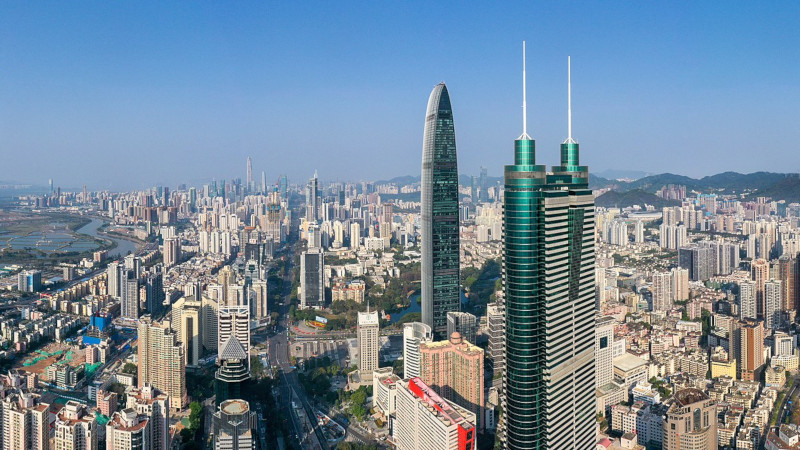
Hackers Beware: Shenzhen Is Closing
If you’re among those of us with immediate plans for a PCB or parts order from China, watch out – Shenzhen just recently got put on a week-long lockdown. Factories, non-essential stores…
China claims it has obtained malware used by the NSA to steal files, monitor and redirect network traffic, and remotely control computers to spy on foreign targets.
The software nasty, dubbed NOPEN, is built to commandeer selected Unix and Linux systems, according to Chinese Communist Party tabloid Global Times, which today cited a report it got exclusively from China's National Computer Virus Emergency Response Center.
Trouble is, NOPEN was among the files publicly leaked in 2016 by the Shadow Brokers. If you can recall back that far, the Shadow Brokers stole and dumped online malware developed by the NSA's Equation Group.
At the time, security researchers at Vectra analyzed NOPEN in the leaked materials, and described it as a remote-access trojan for Unix-flavored systems, which matches the NOPEN Global Times got excited about today.
In effect, Global Times has told us China has "captured a spy tool deployed by the US National Security Agency," which would be a spy tool we've known about for years.
Why China would like the world to once again know about NOPEN is anyone's guess. Perhaps Beijing wanted to counter claims by the West that China has been spying on organizations and ripping off their intellectual property, or hoped to inject some extra mischief into the tense standoff between Russia, China, and the West over President Putin's bloody invasion of Ukraine.
The NSA used NOPEN to take over "a large number" of computers around the world, and the theft of data from this equipment has caused "inestimable losses," we were told today. The American malware would install a backdoor that once activated would allow miscreants to connect in, extract files, change the operation of the system, and explore the network for other resources to hijack or steal, it is claimed.
The NSA declined to comment on NOPEN and other claims of spies-doing-spying in the article.
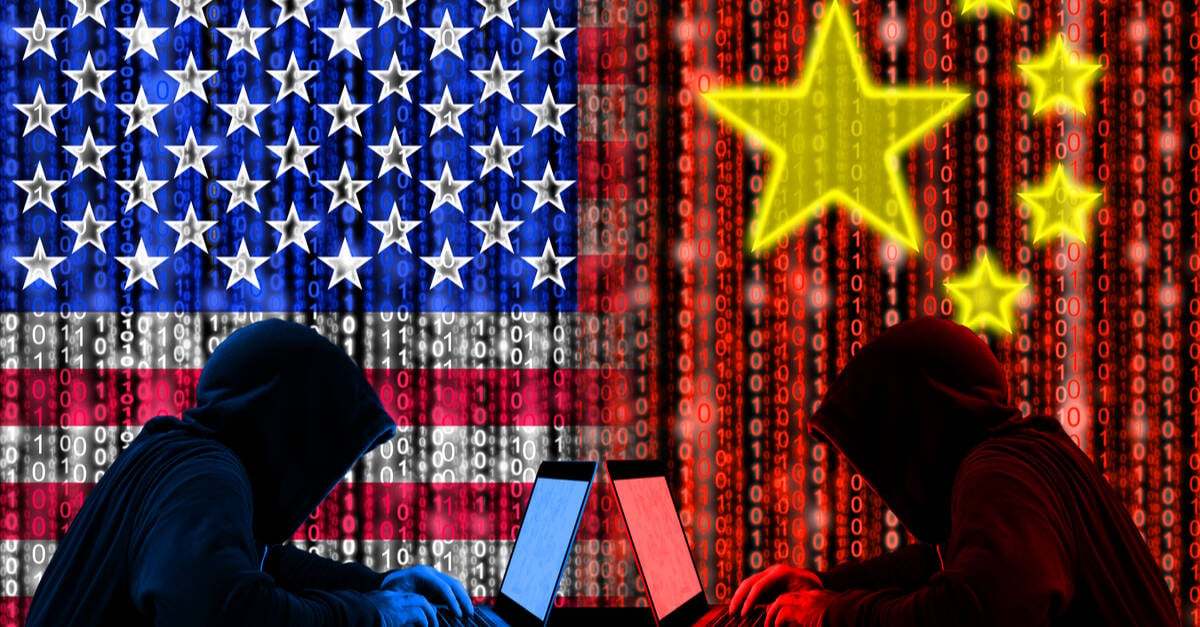
China claims it captured NSA spy tool that already leaked
Not now with your mischief, Beijing

China, "Yes."
China's president Xi Jinping has declared "there can be no modernization without informatization,” and outlined a strategy for how the world's most populous nation will use information technology to transform society and government.
A document posted by the Cyberspace Administration of China (CAC) quotes Xi as saying "informatization has brought a once-in-a-lifetime opportunity to the Chinese nation" and outlines a range of digital transformation tasks that must be achieved under the 14th five year plan (2021–2026) to achieve the desired level of digitization.
One development touted as enabling Chinese society to reach its next level of digitization is the creation of a "one card" which will expand on China's existing digital social security card that serves in employment and social insurance matters. The proposed card will add integration of government services, medical and drug purchases, subsidy management and more.
The plan is for the card to run on a mooted "big platform" that uses blockchain and extensive data sharing to link government applications such as social security, the labor market, and health services.
A single portal for accessing government digital services is also envisioned.
To further tap digital potential, the country will rely on big data – which China also intends to improve, according to the document. Improvement will come in the form of collection and aggregation, sharing, and digitizing historical data to form a national unified application resource.
These electronic libraries are imagined to provide services like data comparison, status verification, identification pictures and trend analysis, with data shared across departments and businesses.
The last two goals are to improve the service levels and security of newly integrated digital systems, and thereby encourage citizens to use more online services.
Beijing wants all of this accessed with a network security protection system that adapts to the times – offering peerless data security and personal privacy.
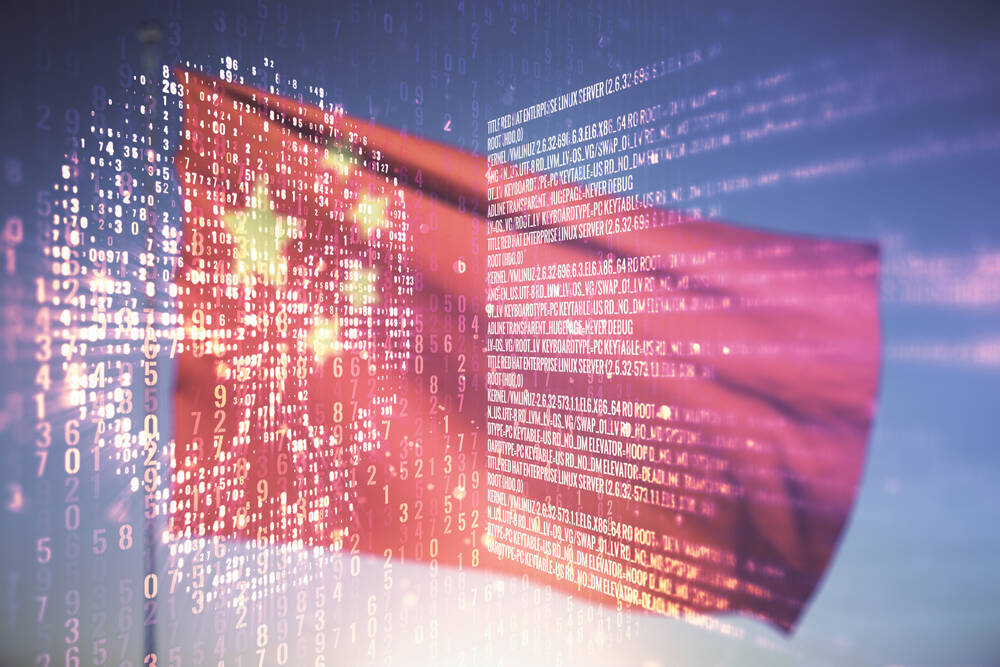
China's new era has singular identity cards and platforms
Xi's vision for once-in-a-lifetime transformation includes singular identity cards, shared data, and huge clouds
China has fully militarized at least three of several islands it built in the disputed South China Sea, arming them with anti-ship and anti-aircraft missile systems, laser and jamming equipment and fighter jets in an increasingly aggressive move that threatens all nations operating nearby, a top US military commander said Sunday.
US Indo-Pacific commander Admiral John C Aquilino said the hostile actions were in stark contrast to the Chinese president Xi Jinping’s past assurances that Beijing would not transform the artificial islands in contested waters into military bases. The efforts were part of China’s flexing its military muscle, he said.
“Over the past 20 years we’ve witnessed the largest military buildup since world war two by the PRC,” Aquilino told the Associated Press in an interview, using the initials of China’s formal name. “They have advanced all their capabilities and that buildup of weaponization is destabilizing to the region.”

China has fully militarized three islands in South China Sea, US admiral says
John C Aquilino says Beijing is flexing its military muscle by arming isles with fighter jets, anti-ship systems and other military facilities
The Philippines and the United States will kick off the largest-ever joint military drills in the archipelago nation next week, US officials said Tuesday, showing off their strong defence ties in the face of growing Chinese assertiveness.
Nearly 9,000 Filipino and American soldiers will take part in the 12-day war games on the main island of Luzon, which are usually an annual affair but were cancelled or curbed during the pandemic.
The exercises, which start March 28, will cover among other things maritime security, live-fire training, counterterrorism, and humanitarian assistance and disaster relief, the US embassy said in a statement.
"(Both sides) will train together to expand and advance shared tactics, techniques and procedures that strengthen our response capabilities and readiness for real-world challenges," said Major General Jay Bargeron, commander of the US 3rd Marine Division.
Recent manoeuvres between the longtime allies have focused on potential conflict in the South China Sea, which Beijing claims almost in its entirety.
China has ignored a 2016 ruling by The Hague-based Permanent Court of Arbitration that its historical claim is without basis.
It has reinforced its stance by building artificial islands over some contested reefs and installing weapons on them.
The Philippines, Brunei, Malaysia, Taiwan and Vietnam also have competing claims over the waters.
Tensions between Manila and Beijing spiked last week after the Philippines confronted China's ambassador over a Chinese navy ship caught illegally "lingering" in its archipelagic waters.
The exercises will also be held in the shadow of the Russian invasion of Ukraine, where the US and its allies are providing defensive weapons to Kyiv and imposing crippling economic sanctions on Moscow.
President Rodrigo Duterte expressed concern Monday that the Philippines was "involved" in the conflict because of its security alliance with the United States.
That includes a mutual defence treaty and permission for the US military to store defence equipment and supplies on several Philippine bases.
Apple has stopped political censorship of terms that buyers choose to have engraved onto its products in Taiwan – but has kept the policy in both mainland China and Hong Kong, leading an academic research group to wonder whether Apple does not fully understand its own censorship policies and applications, or is bowing to Beijing's wishes.
In August 2021, Citizen Lab – a research group based out of the University of Toronto – conducted extensive research into how Apple filters terms submitted to its engraving services. Apple allows buyers to have custom messages etched on the exteriors of iPhones, AirPods, iPads and other Apple products, but even in the most liberal democracies it places some limits on what it will engrave – no swear words, for example.
That research found Apple inconsistently applied content moderation – going beyond legal requirements in Hong Kong while disallowing terms likely to anger Beijing for Taiwanese customers even though it had no obligation to do so.
Furthermore, the researchers could find no public document listing terms that Apple refused to engrave. The lack of guidelines or policy led Citizen Lab to conclude "Apple does not fully understand what content they censor."
"Rather than each censored keyword being born of careful consideration, many seem to have been thoughtlessly re-appropriated from other sources," wrote the researchers.
At the time, Apple responded [PDF] by stating that it created its own list of forbidden words, and always applies local laws as required.
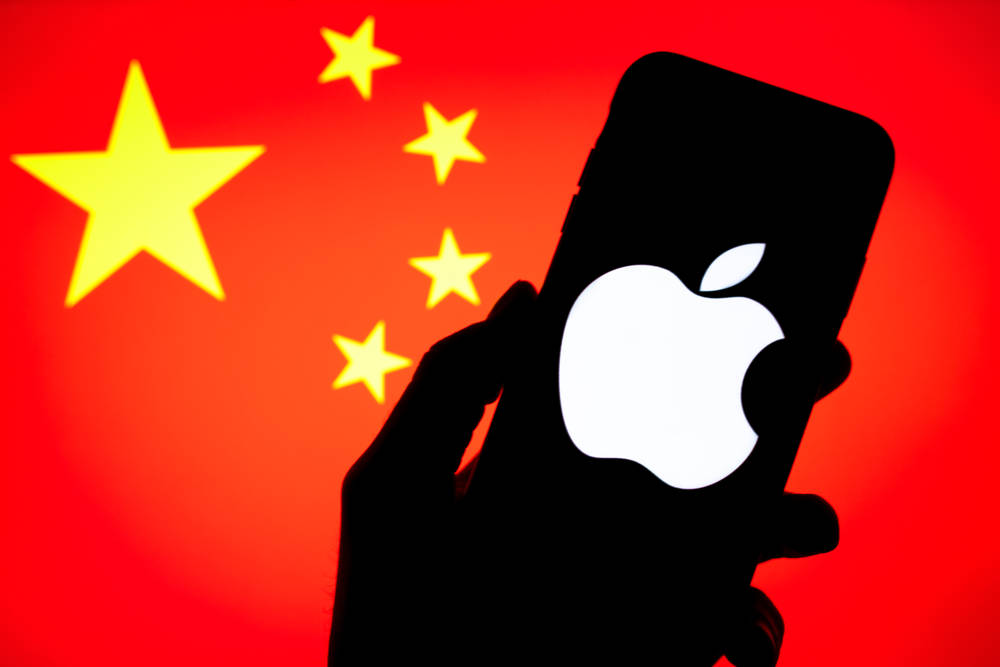
Apple amends censored words for engraving services in Taiwan
Still won't let Hong Kong buyers use terms Beijing may not appreciate
Citizen Lab has now revisited the matter and found China-friendly censorship has ceased in Taiwan. Script like "StandWithHongKong" and "8964" – a reference to Tiananmen Square – can now be engraved onto iThings in Taiwan. But not in Hong Kong or mainland China.
Scott Morrison says Australia was not blindsided by a draft security deal between China and Solomon Islands, which experts warn has demonstrated a “black and white” intent at expanding influence in the Pacific.
The draft would allow China to base navy warships in the Pacific less than 2,000km off the Australian coast, but some experts, including the Lowy Institute’s Jonathan Pryke, caution it reads more like a “wishlist” from China than a finalised agreement.
While the document still needs to go through the Pacific nation’s cabinet, the Solomon Islands government confirmed on Friday it was seeking to “broaden its security and development cooperation with more countries”, referring to Australia and China as its “two major partners”.
In November, Australia sent more than 100 police and defence force personnel to Solomon Islands to help quell unrest, but found itself in competition with China which also agreed to send police.

Chinese draft security deal with Solomon Islands didn’t blindside Australia, Morrison says
Analysts say unratified document which would allow China to base ships in the Pacific is a ‘wish list’ which reveals nation’s intent in ‘black and white’
The Australian prime minister said that China’s push for a security deal with Solomon Islands highlights “the constant pressure and … push that is coming into the region from interests that are not aligned with Australia’s and not aligned with those of the Pacific”.
Morrison noted Australia had negotiated a bilateral security deal with Solomon Islands in 2017, and is always the “first call” when a crisis arises.
“Now, there are others who may seek to pretend to influence and to seek to get some sort of foothold in the region,” he said.
Lievää kuumenemista.“There’s all sorts of engagement that China could do to build its way up to a military presence,” he said.
https://www.theguardian.com/world/2...omon-islands-police-by-china-triggers-concern
“Get this agreement, start with police, maybe the next step would be to set up some dual-use coast guard facility, then put up a fuel depot.”
“Because it’s happening piecemeal, it’s happening without too much alarm.
“If … at every turn the alarm is raised and it gets international attention and forces Solomon Islands to react, it reduces the likelihood of them moving on to the next step.”
Earlier, the Labor leader, Anthony Albanese, said if reports of the deal are correct “then this would have real implications for the region, and is of concern”.
“Australia needs to be a partner of choice in the Pacific,” he told reporters in Shellharbour. “We were that for a long period of time.
“When this government came to office and withdrew funding, in terms of its aid and its presence in the Pacific, that was an error of judgment,” he said.
“We have had the Pacific step-up in terms of rhetoric. That’s a good thing. We need to make sure that we engage with the region.”
A shipment of replica firearms by China to Solomon Islands police has caused concern as the Pacific nation grapples with security concerns sparked by its increasingly close relationship with Beijing.
The police force had been criticised over the secrecy surrounding delivery of what a local media report called a “large shipment of arms” that arrived in the country on a logging vessel earlier this month from an unknown source.
On Tuesday the police said the firearms – 95 rifles and 92 pistols – were replicas donated by China for police training and denied accusations the force had anything “to conceal or hide”. It also published pictures of police training with the replicas.
Solomon Islands banned firearms and replica weapons in 2000 during a bloody ethnic conflict in which police armouries were raided by militia groups. However, police were allowed to carry weapons again in 2017.

Secret shipment of replica guns to Solomon Islands police by China triggers concern
Police had been criticised after reports that a ‘shipment of arms’ arrived in the country on a logging vessel from an unknown source
Vietnam laajentaa
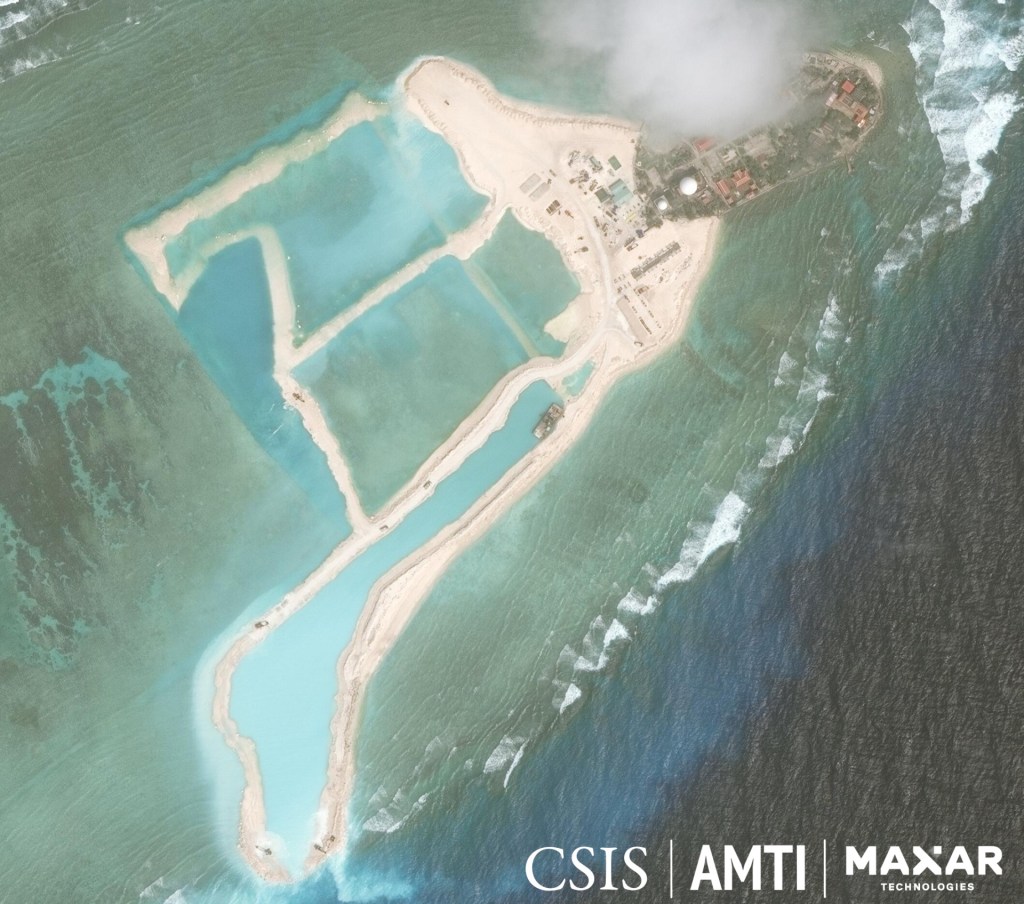
Pearson's Reef
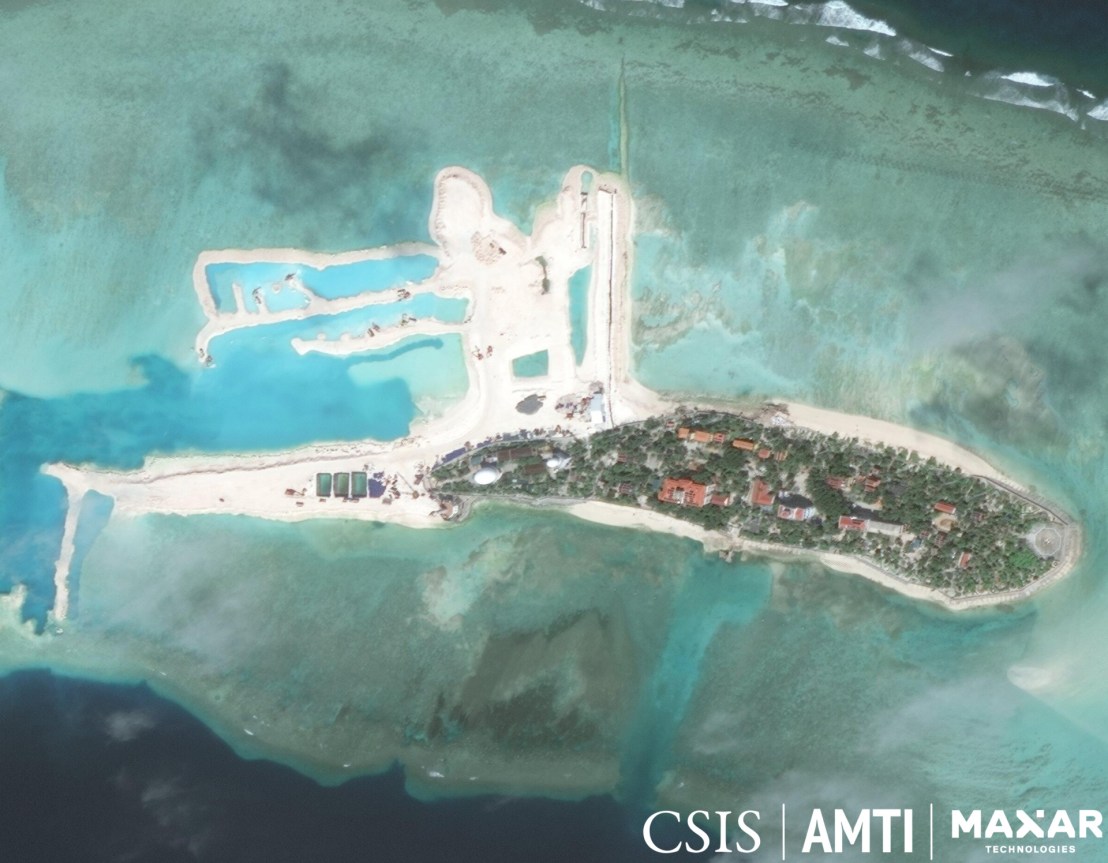
Namyit
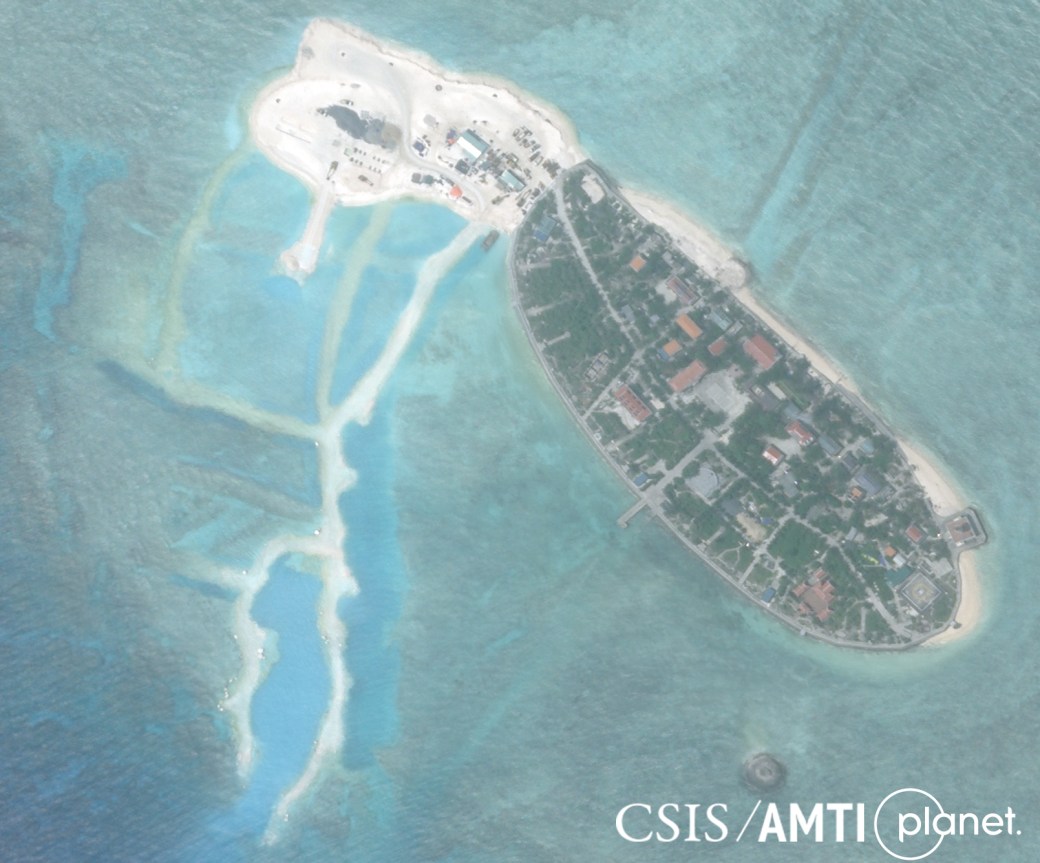
Sand Cay
Linkin alla muita korjauksia ja muutoksia heidän saarilleen

 amti.csis.org
amti.csis.org

Pearson's Reef

Namyit

Sand Cay
Linkin alla muita korjauksia ja muutoksia heidän saarilleen

Castles Made of Sand: Vietnam's Spratly Upgrades | Asia Maritime Transparency Initiative
Updated July 8, 2022 In the last six months, Vietnam has engaged in new dredging and landfill at three of its occupied features in the Spratly Islands. And over the past year, it has continued minor upgrades and construction of new buildings on several bases. Amid these improvements, Vietnam has...
“Beijing has been trying to mould Hong Kong into another [Chinese] city,” says Lynette Ong, a political science professor at the University of Toronto. “The Covid crisis gives them a legitimate reason to do so.”
Besides the construction of a Covid-19 hospital in Lok Ma Chau, mainland China has already assisted Hong Kong with the building of five other isolation facilities for patients with mild or no symptoms. China and Hong Kong are among the last places in the world that still isolate or hospitalise Covid patients who are in a stable condition.
Infrastructure projects in Hong Kong typically involve construction firms submitting tenders to compete for billion-dollar contracts. But all of the facilities being built with mainland aid have been handed over to Chinese State Construction Engineering, a state-owned company.
At an opening ceremony for the newest centre in the northern district of Yuen Long, top Hong Kong officials stood at attention as a video of toiling construction workers, portrayed as worked-to-the-bone heroes, played before them. A song in Mandarin, instead of the Cantonese language spoken in Hong Kong, played in the background.
“The scale and speed at which these projects were finished is unprecedented,” Hong Kong’s leader Lam said at the Thursday ceremony. “This will go down in the history of Hong Kong’s Covid-19 fight.”
Lam is used to talking about the crisis in terms of conflict. “In an environment as urgent as this, we cannot let existing laws stop us from doing what we should do … this is not the mentality for fighting a war,” she said in February.
Jeffrey Wasserstrom, a history professor at the University of California, Irvine, says “there was once a chasm separating what takes place in Hong Kong from what takes place across the mainland border”. That chasm is getting smaller.
Under the national security law, spaces like independent newsrooms, universities and civil society groups have felt a chill as Beijing seeks to integrate Hong Kong further into its fold.
And as Hong Kong prepares to welcome a batch of traditional Chinese medicine practitioners to staff treatment facilities and open more isolation camps built by mainland workers, the assimilation is now playing out more publicly than ever.
“The way that Covid has been handled by the Hong Kong authorities has demonstrated that the ‘one country, two systems’ concept is a pale shadow of what it once was,” Wasserstrom says.

How Covid helped China tighten its hold on Hong Kong
Doctors from the mainland are treating patients and Chinese workers are building hospitals as Beijing’s presence is felt like never before
Solomon Islands prime minister Manasseh Sogavare has dismissed foreign criticism of the country’s security negotiations with China as “insulting” and called those who leaked the draft agreement “lunatics”, in his first comments to parliament on the proposed treaty.
“We find it very insulting, Mr Speaker, to be branded as unfit to manage our sovereign affairs,” Sogavare said on Tuesday.
A leaked draft security agreement being negotiated between China and Solomon Islands has triggered alarm in the Pacific, including in Australia and New Zealand. The two neighbours are worried it could jeopardise regional stability, with China having the opportunity to base navy warships in the Pacific less than 2,000km off the Australian coast.
Sogavare would not give further details on the contents of the security deal, but when pressured later in parliament on how advanced talks were said it was “ready for signing”.
The prime minister took aim at Australian media for implying that China was pressuring the Islands into a treaty, calling the claims “unfounded” and “very insulting”.
A News Corp article late last week also quoted a commentator as saying that Australia “must be willing to invade the Solomon Islands and topple its government if that’s what is necessary to stop a proposed security pact between China and the Pacific nation going ahead”.
Sogavare said: “Discussions in the Australian public media encouraging the invasion of Solomon Islands to force a regime change, Mr Speaker, does nothing to strengthen our bilateral relations. When a helpless mouse is cornered by vicious cats, it will do anything to survive.”
“We welcome any country that is willing to support us in our security space. There is no devious intention, nor secret plan – this is a decision by a sovereign nation that has its national interest at heart,” he added.
The treaty could only be activated at the nation’s request, Sogavare said, adding that it was “utter nonsense” that China’s presence in the region was a threat to security.

Solomon Islands prime minister says foreign criticism of China security deal ‘very insulting’
Manasseh Sogavare says it is ‘utter nonsense’ that China’s presence is a threat to regional stability
Olympiakasarmi
Kenraali
Lännen pitäisi nopeasti vähentää Kiina riippuvuuttaan. Ensimmäinen askel olisi täydellinen investointikielto Kiinaan. Samoin kiinalaisten osakkeiden ja velkapapereiden omistaminen pitäisi kieltää lyhyen siirtymäkauden jälkeen.
China's big tech companies are making deep job cuts, and at least one is framing them as "graduation" from the company.
Reports of the job cuts have circulated for weeks, with Alibaba reportedly offloading more than 40,000 workers, and Tencent potentially losing around a tenth of its headcount. Ride-sharing company DiDi has also cut staff loose, as has ByteDance. None have addressed the matter in public.
Some of the job losses were made in response to Chinese regulations that have curtailed web giants' activities. Beijing's ban on online tutoring colleges has wiped out business units at big tech firms and plenty of small companies alike.
Some job cuts have been in poorly performing business units, while others have been done to cut costs.
E-tail giant JD.com has reportedly used all of the above rationales for its job cuts, which appear to have been detailed in an internal spreadsheet that leaked to Chinese media. The document details closures of some operations, and deep cuts among technology teams.
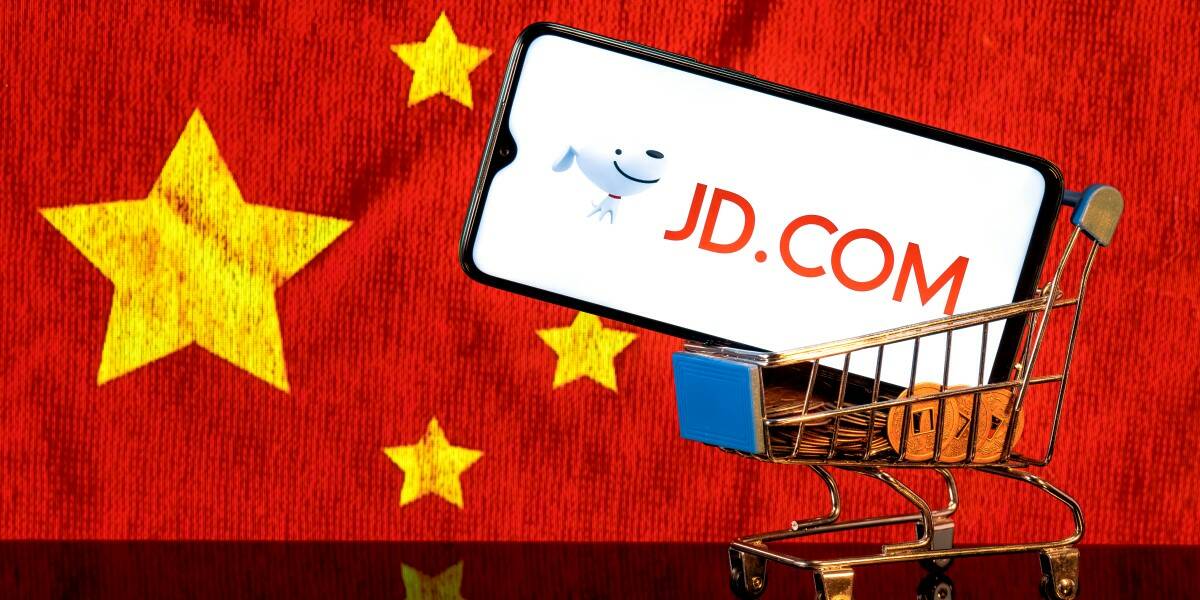
China's JD.com calls sackings 'graduations'
Massive job losses reported across Middle Kingdom's tech sector
While the job losses and Beijing's restrictions on its tech giants are attracting lots of attention in China, they are in no way a sign that the nation has de-emphasized technology's role in China's economy or future. To the contrary, China recently announced a wave of efforts to digitize its economy.
State-controlled media and government agencies are keen to feature case studies that explain how internet connectivity is creating new businesses across the nation – even in remote towns. And they emphasize that 1.032 billion Chinese are online and the internet penetration rate is set to increase from today's 73 percent.
Trust the Party: things are only going to get better.
The president of the Federated States of Micronesia has sent an impassioned plea to the Solomon Islands’ prime minister, urging him to reconsider a controversial and “unprecedented” security pact with China.
President David Panuelo voiced “grave security concerns about this proposed agreement” in a 30 March letter released by his government on Thursday, citing rising tensions between China and the United States.
“My fear is that we – the Pacific islands – would be at the epicentre of a future confrontation between these major powers,” Panuelo wrote.

Pacific leader urges Solomon Islands to rethink China security deal
President of the Federated States of Micronesia says he fears Pacific Islands ‘would be at the epicentre of a future confrontation’ between China and the US
A Beijing court is holding a closed-door trial for Australian journalist and former TV anchor Cheng Lei, in a high-profile diplomatic case.
Ms Cheng is accused of illegally supplying state secrets overseas. Her family maintains she is innocent.
The Chinese-born Australian was working for Chinese state media outlet CGTN prior to her detention in August 2020.
Canberra has repeatedly raised concerns over her detention and has called for "basic standards of justice" to be met.
Little is known about the exact nature of Ms Cheng's alleged offences.
Speaking to reporters outside of the courtroom on Thursday, Australia's ambassador to China Graham Fletcher said he and other Australian officials had been denied entry into the hearing. Chinese courts often bar outsiders from trials deemed as politically sensitive.
"This is deeply concerning, unsatisfactory and regrettable. We can have no confidence in the validity of the process which is conducted in secret," he said, adding that Australia would continue to "advocate strongly for Ms Cheng Lei's rights and interests".
Ms Cheng, who was previously reported to have suffered ill health while in detention, was now "doing okay" considering the circumstances, said Mr Fletcher. Ms Cheng's lawyer had also told Australian media that she was in good health and good spirits.
Mr Fletcher added that Australia has requested that Ms Cheng be allowed to speak to her children.
"They haven't had any contact with their mother since the detention," he said.
A family statement released to Reuters on Wednesday said her children and elderly parents "miss her immensely and sincerely hope to reunite with her as soon as possible."

Cheng Lei: Australian journalist on trial in China for spy charge
A Beijing court is holding a closed-door hearing for former CGTN journalist Cheng Lei.
